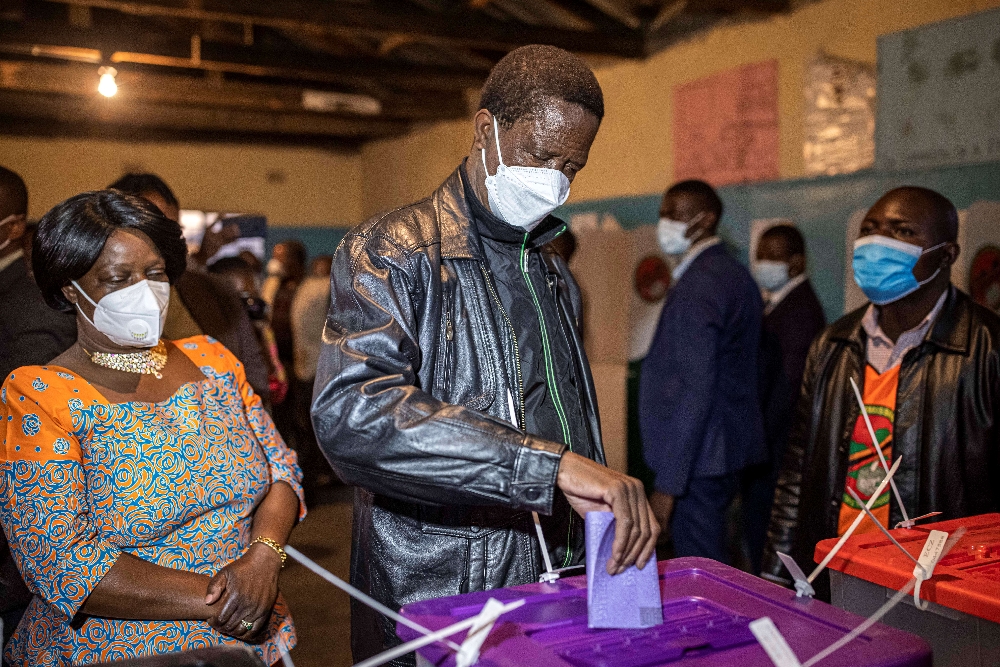Lusaka – Zambians were voting in a general election on Thursday after a tense campaign dominated by economic woes, a debt crisis and the impact of the coronavirus pandemic.
Sixteen presidential candidates are vying for the top job, but the frontrunners are incumbent Edgar Lungu, 64, and his long-time rival Hakainde Hichilema, a business tycoon, who are facing off at the polls for the third time.
Hichilema, 59, who is running for a sixth time, is backed by an alliance of 10 parties.
After voting shortly after polls opened at 06:00 (0400 GMT) Lungu exuded confidence he would retain the job he had held for the past six years.
“We are winning, otherwise I wouldn’t have been in the race if we were not winning, we are a winning team,” the upbeat Lungu told reporters outside a nursery school in Chawama, a poor neighbourhood of Lusaka.
ALSO READ | Army re-inforcement, social media curbs as Zambia votes in tightly contested polls
But a flagging economy and rising living costs have eroded his support base in recent years, surveys suggest, and the election could be even tighter than 2016 polls when he narrowly scraped a victory over Hichilema.
Lungu, a lawyer by training, is accused of borrowing unsustainably, particularly from Chinese creditors, to finance a spree of infrastructure projects.
Under him, Zambia became the first African country to default on its sovereign debt since the coronavirus pandemic began, while inflation soared to 24.6 percent in June, the highest rate in more than a decade.
Africa’s second biggest producer of copper after the Democratic Republic of Congo, and the eighth producer in the world, missed another debt repayment this year.
Winding queues of hundreds of people formed before dawn outside polling stations, hours before voting was due to open around densely-populated and working class neighbourhoods of Lusaka.
ALSO READ |Vote count under way in Zambia after hard-fought election as army reinforced
Almost mid-way through the voting day in central Lusaka’s popular Mtendere township, hundreds of voters patiently waited for their turn to cast ballots, chatting away or sucking on ice lollies, or popsicles, sold by a roving vendor.
The atmosphere was relaxed and festive, with nearby taverns serving beer while music blasted from cars driving in heavy traffic on bumpy roads.
Copper miner Thomas Wandu, 41, had been queueing for seven hours to vote for Lungu.
“Underground, things are not how they are supposed to be,” he told AFP, referring to what he described as low and delayed wages by his Chinese employers.
Lungu’s critics point to the high cost of living, poverty and joblessness.
In Chamawa township unemployed school teacher Ernest Chimba, 35, was “hoping for change… because the cost of living in Zambia has gone really high”.
ALSO READ | Zambia opposition lies low in capital as voting day nears
Tensions flared in the run-up to polling in this southern African country of 17 million people.
Supporters of Lungu’s Patriotic Front (PF) and Hichilema’s United Party for National Development (UPND) clashed in the runup to voting, prompting Lungu to order an unprecedented deployment of the army.
The president has also grown tough on dissent since he took power in 2015, raising concerns of heavyhandedness if results are contested.
Around seven million citizens are registered to vote for a president, legislators and local government representatives.
The winning candidate must acquire more than 50 percent of votes to avoid a second vote. Analysts say a runoff, which would be within 37 days of the first round, is unlikely, however.
Lungu is confident of bagging half-a-million votes more than Hichilema.
ALSO READ |Economic woes set to weigh heavily on high-stakes Zambia vote
Hichilema is pinning his hopes on disenchantment with Lungu’s administration of the economy to clinch the presidency.
The opposition has accused the government of seeking to rig the ballot – allegations the PF has rejected.
United Nations chief Antonio Guterres is “closely” following the vote and called on all candidates “to do their part to create an environment conducive to credible, inclusive and peaceful elections”, his spokesperson Stephane Dujarric said.
Analysts fear tensions could flare after the vote.
There will “likely to be contestations on the results, that may catalyse some unrest, especially in the urban areas of Lusaka and the Copperbelt,” said Patience Mususa, of the Nordic Africa Institute.
Polls close at 18:00 (1600 GMT) at more than 12 000 voting stations dotted across the vast country. Official results are expected by Sunday.
Follow African Insider on Facebook, Twitter and Instagram
Source: AFP
Picture: AFP
For more African news, visit Africaninsider.com


